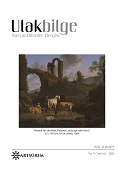Nabokov vs. Dostoevsky: The Duality Of Standards and a Universal Message Conveyed
Nabokov vs. Dostoevsky: The Duality Of Standards and a Universal Message Conveyed
Author(s): Mohammed Amine Belaid, Imane Hind SariSubject(s): Semiology, Aesthetics, Sociology of Culture, Theory of Literature, Sociology of Literature
Published by: Sanat ve Dil Araştırmaları Enstitüsü
Keywords: community; criticism; Jungian Theory; collective unconsciousness;
Summary/Abstract: Literature underwent thousands of phases that caused people to react distinctly to the endless fluid of literary perception. The purpose of this study is to highlight the impact this continuity of changes had and still have on literary criticism. To epitomize the previous idea, we had to juxtapose the lives of two writers who witnessed different eras: Dostoevsky and Nabokov. The two figures experienced their intertwined fates with variant attitudes and welcomed all the occurrences with an open mind, a number of life-changing works sprang up from their collections of events and particularly personal accounts. This paper also aims to psychologically apply the former nuances of Nabokov’s criticism on Dostoevsky on his own writings in order to demonstrate the identical traits of the literary artist. The Jungian Theory served in this sense to bridge the gap between them and emphasize the emergence of the collective unconscious in the literary realm.
Journal: Ulakbilge Sosyal Bilimler Dergisi
- Issue Year: 9/2021
- Issue No: 61
- Page Range: 821-831
- Page Count: 11
- Language: English

